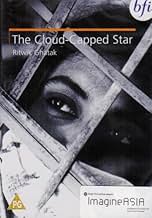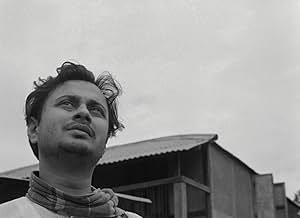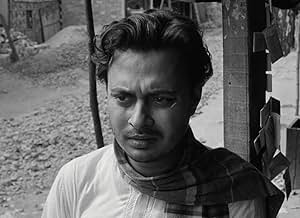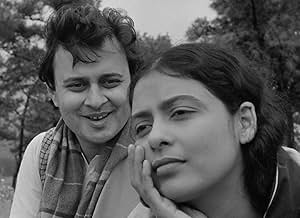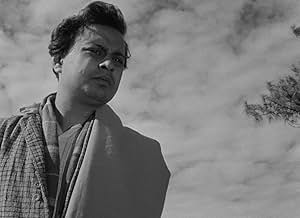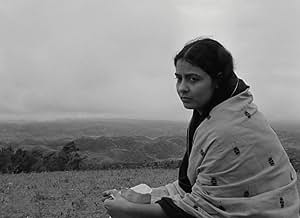IMDb रेटिंग
7.8/10
3.5 हज़ार
आपकी रेटिंग
एक निस्वार्थ युवती अपने अप्रसन्न परिवार के लिए अपनी खुशी का त्याग करती है.एक निस्वार्थ युवती अपने अप्रसन्न परिवार के लिए अपनी खुशी का त्याग करती है.एक निस्वार्थ युवती अपने अप्रसन्न परिवार के लिए अपनी खुशी का त्याग करती है.
- पुरस्कार
- कुल 1 नामांकन
Ranen Ray Choudhury
- Baul singer
- (as Ranen Chowdhury)
फ़ीचर्ड समीक्षाएं
This movie by Ritwik Ghatak is on the list of most of the Indian big times directors as one of the best movies of Indian cinema. The name of the movie means Cloud Capped Star what a lovely name.
The story is about a girl Nita (Supriya Choudhury) in a family who have migrated to India from Bangladesh, after the partition and staying in a small West Bengal town in poverty. Nita is the second child in the family of two boys, two girls and parents. After her father's (Bijon Bhattacharya) health detoriates she has to take the responsibility of being the bread winner because she is educated. Her beloved elder brother Shankar (Anil Chatterjee) is an aspirational singer and does not want to work. Her younger brother Mantu (Dwiju Bhawal) leaves his studies and becomes a daily laborer. Nita's boy friend Sanat (Niranjan Roy) gets attracted to her sister Gita (Gita Ghatak) and marries her. Nita carrier the burden of all these silently, but it takes toll on her health and mind who is finally sent to treatment in a remote hospital where Shankar goes to meet her in the end of the movie.
The movie though latent in high emotions is a superb story unfolding, with so much humanness that it touches your heart even today through it (sometimes) melodramatic 1960 style.
This was the first movie of Ritwik Ghatak that I have seen till date, and I consider myself fortunate, because Ritwik was called by the Life Time Oscar winner Satyajit Ray as his inspiration and Satyajit Ray always considered Ritwik the best in India.
Ritwik presents the drama with such finness of light and darkness, using great visuals, sound and symbols to present a tender emotion. The foliage, the train, the mountains, the soul rendering vocals remain with you for long after the movie.
A must see for all the students of good cinema. A master piece indeed! (Stars 7.75 out of 10)
The story is about a girl Nita (Supriya Choudhury) in a family who have migrated to India from Bangladesh, after the partition and staying in a small West Bengal town in poverty. Nita is the second child in the family of two boys, two girls and parents. After her father's (Bijon Bhattacharya) health detoriates she has to take the responsibility of being the bread winner because she is educated. Her beloved elder brother Shankar (Anil Chatterjee) is an aspirational singer and does not want to work. Her younger brother Mantu (Dwiju Bhawal) leaves his studies and becomes a daily laborer. Nita's boy friend Sanat (Niranjan Roy) gets attracted to her sister Gita (Gita Ghatak) and marries her. Nita carrier the burden of all these silently, but it takes toll on her health and mind who is finally sent to treatment in a remote hospital where Shankar goes to meet her in the end of the movie.
The movie though latent in high emotions is a superb story unfolding, with so much humanness that it touches your heart even today through it (sometimes) melodramatic 1960 style.
This was the first movie of Ritwik Ghatak that I have seen till date, and I consider myself fortunate, because Ritwik was called by the Life Time Oscar winner Satyajit Ray as his inspiration and Satyajit Ray always considered Ritwik the best in India.
Ritwik presents the drama with such finness of light and darkness, using great visuals, sound and symbols to present a tender emotion. The foliage, the train, the mountains, the soul rendering vocals remain with you for long after the movie.
A must see for all the students of good cinema. A master piece indeed! (Stars 7.75 out of 10)
it's just that he made films for the love of it and never for anyone else that this somewhat forgotten legend later realised to be great made such a deep film.This film is not about cinematography unlike ray's but this is about the script.The scene where the father say's "you bore the burden and now you are the burden,you shall go' is a landmark in itself.Especially the believe in her somewhat useless brother who becomes a gr8singer in bollywood .This film has to be seen without any distractions.i give film -10 ,script -11, and cinematography -9 all out of 10.The background music is amazing ,it;s tearful.After ,watching i am almost compelled to take up a camera and shoot a film for myself.I don't care about this plastic world anymore.
For someone who is not quite in the know, the subject matter of the story is to us who grew up in that time and place quite mundane. I know exactly the kind of girl Ghatak is talking about here, even a decade ago there were many of them I could see while commuting in Kolkata. Things have changed, though, and it is nice to have such a compelling piece of art to retain those memories.
But of course Ghatak is working on two planes in this movie. Ostensibly about the hapless girl driven by circumstance, the poor, gentle, tough, dreamy girl who is laid bare by the vicissitudes of existence may as well be that other great love of the director's life, mother Bengal.
But of course Ghatak is working on two planes in this movie. Ostensibly about the hapless girl driven by circumstance, the poor, gentle, tough, dreamy girl who is laid bare by the vicissitudes of existence may as well be that other great love of the director's life, mother Bengal.
If Satyajit Ray is the virtuoso of Indian cinema, Ghatak is the maverick. His films aren't as polished or subtle as Ray's, but he takes bold chances. Most blatantly in the sound design, with startling (and often beautiful) use of music, ambient noise, reverb, and effects that are almost sci-fi. Perhaps only Lynch is as distinctive in the employment of audio techniques. Not all of Ghatak's gambles pay off. Take, for instance, his insistence on casting the goofy Bijon Bhattacharya in most of his films. Bhattacharya's performance here isn't quite as damaging as his turn in THE GOLDEN THREAD, but it's easily the weakest aspect of the film. However, the primary focus is on Nita (Supriya Choudhury), the girl whose family walks all over her, and resent her for it in the process. As her brother chides her: "You'll suffer. Those who suffer, suffer forever." The family is a microcosm of Ghatak's obsession, the damage caused by the Partition, commenting on those who exploit the weak, and those who let themselves be exploited. It's high melodrama, but like Sirk, is done so artfully and effectively that it's a wonder to behold, with breathtaking images, unforgettable moments, and that idiosyncratic audio field.
10davidals
The visionary Bengali filmmaker Ritwik Ghatak peers into the future, and sees nothing but disintegration - succeeding at multiple levels, CLOUD-CAPPED STAR humanizes this bleak vision, by locating the drama in a Bengali family, but everything occurring is something of a howl of outrage at what had become of his divided homeland.
The central figure in this sprawling melodrama (with some coincidental resemblances to European new wave and neo-realism) is Nita, the eldest daughter in a once-middle class, intellectual family, driven by partition into refugee status in the slums of Calcutta. Varied family members react in different opportunistic ways to their reduced status, and their need to survive, all of which takes an extreme toll on Nita, who ultimately becomes the family's sole breadwinner. The performances throughout are excellent - Supriya Choudhury as Nita is riveting, and Niranjan Roy is particularly strong as Sanat.
Throughout, Ghatak boils human nature and the survival instinct down to the most ruthless basics: this is a compelling and visionary film, but there is virtually no room for lofty ideals or sentimental altruism in the world created here - mourn what one must, and do what one must do to survive. Sentiment and ideals are - in this film - luxuries, and from the cruelty of such a truism, Ghatak has created one of cinema's great, vital tragedies.
Ghatak claimed few Western cinematic influences - like Jean-Luc Godard in France and Nagisa Oshima in Japan, his primary concerns were historical and political, and also technical - how to alter cinema to express those concerns in accessible language? For Ghatak the solution was found in using outdoor locations, natural sound, idiosyncratic editing, and a minimum of the flash seen in Bollywood or Hollywood - CLOUD-CAPPED STAR is bleak, absolutely gripping, tragic and infuriating. As drama, it would definitely rank as one of the more obscure global masterpieces out there (there has yet to be an official US release on VHS or DVD), rarely seen or commented upon. This is highly unfortunate - as a film of moral/social outrage, this rivals Bresson; its' overall feel for the everyday reminds one of Italian neo-realism; it's willingness to experiment boldly evokes Godard or Oshima; in it's concerns with the status of women (another of the many themes explored here), it evokes Naruse, Sirk or Mizoguchi.
Ghatak's own biography is one of great tragedy; one could possibly read the discretely enraged hopelessness of this film as an extension of his own, and see this as a drive that would have to produce at least one masterpiece (his later SUBARNA-REKHA is also very much worth a look), even as it brought him to a premature end. For all of its' bleakness, CLOUD-CAPPED STAR is absolutely compelling - any cinephile (or student of history) would do well to see it.
The central figure in this sprawling melodrama (with some coincidental resemblances to European new wave and neo-realism) is Nita, the eldest daughter in a once-middle class, intellectual family, driven by partition into refugee status in the slums of Calcutta. Varied family members react in different opportunistic ways to their reduced status, and their need to survive, all of which takes an extreme toll on Nita, who ultimately becomes the family's sole breadwinner. The performances throughout are excellent - Supriya Choudhury as Nita is riveting, and Niranjan Roy is particularly strong as Sanat.
Throughout, Ghatak boils human nature and the survival instinct down to the most ruthless basics: this is a compelling and visionary film, but there is virtually no room for lofty ideals or sentimental altruism in the world created here - mourn what one must, and do what one must do to survive. Sentiment and ideals are - in this film - luxuries, and from the cruelty of such a truism, Ghatak has created one of cinema's great, vital tragedies.
Ghatak claimed few Western cinematic influences - like Jean-Luc Godard in France and Nagisa Oshima in Japan, his primary concerns were historical and political, and also technical - how to alter cinema to express those concerns in accessible language? For Ghatak the solution was found in using outdoor locations, natural sound, idiosyncratic editing, and a minimum of the flash seen in Bollywood or Hollywood - CLOUD-CAPPED STAR is bleak, absolutely gripping, tragic and infuriating. As drama, it would definitely rank as one of the more obscure global masterpieces out there (there has yet to be an official US release on VHS or DVD), rarely seen or commented upon. This is highly unfortunate - as a film of moral/social outrage, this rivals Bresson; its' overall feel for the everyday reminds one of Italian neo-realism; it's willingness to experiment boldly evokes Godard or Oshima; in it's concerns with the status of women (another of the many themes explored here), it evokes Naruse, Sirk or Mizoguchi.
Ghatak's own biography is one of great tragedy; one could possibly read the discretely enraged hopelessness of this film as an extension of his own, and see this as a drive that would have to produce at least one masterpiece (his later SUBARNA-REKHA is also very much worth a look), even as it brought him to a premature end. For all of its' bleakness, CLOUD-CAPPED STAR is absolutely compelling - any cinephile (or student of history) would do well to see it.
क्या आपको पता है
- ट्रिवियाMeghe Dhaka Tara (1960) is part of the Criterion Collection, spine #993.
- गूफ़When Nita meets her former lover at the tree near the pond (after about 90 minutes), a microphone is visible in the top left corner.
- भाव
Baul singer: [singing] I wasted all my good days, Now, in bad times, I've come to the river's edge, Boatman, I don't know your name, Who shall I call out to? Who shall I call out to? Oh, my heart, who will take you across? There is a boat but no boatman, There is no one on the river bank, There is no one on the river bank...
- कनेक्शनFeatured in The Story of Film: An Odyssey: New Directors, New Form (2011)
टॉप पसंद
रेटिंग देने के लिए साइन-इन करें और वैयक्तिकृत सुझावों के लिए वॉचलिस्ट करें
- How long is The Cloud-Capped Star?Alexa द्वारा संचालित
विवरण
- रिलीज़ की तारीख़
- कंट्री ऑफ़ ओरिजिन
- आधिकारिक साइट
- भाषाएं
- इस रूप में भी जाना जाता है
- The Cloud-Capped Star
- उत्पादन कंपनी
- IMDbPro पर और कंपनी क्रेडिट देखें
- चलने की अवधि
- 2 घं 6 मि(126 min)
- रंग
- ध्वनि मिश्रण
- पक्ष अनुपात
- 1.33 : 1
इस पेज में योगदान दें
किसी बदलाव का सुझाव दें या अनुपलब्ध कॉन्टेंट जोड़ें


